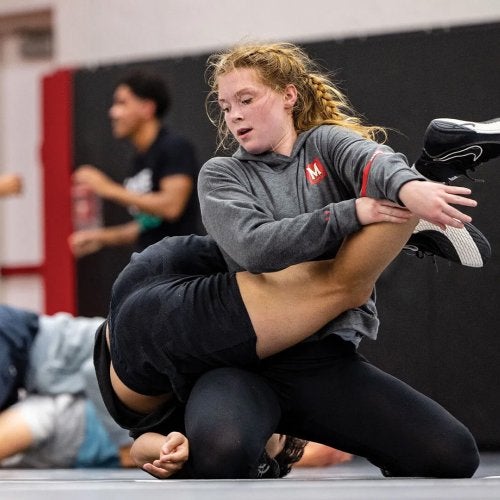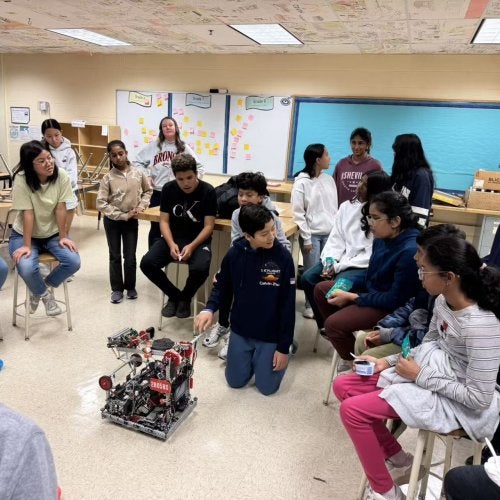University of Maryland, George Washington Graduate Students Travel to Cuba
Graduate students from the University of Maryland and George Washington University traveled to Cuba in February to take part in a nine-day seminar in Cuba called Búsquedas Investigativas (Academic Explorations), where they engaged with education scholars and practitioners from across the island and visited local schools and universities.
The trip was bookended by sessions in the United States: before leaving for Cuba, students, including this author, attended preparatory sessions led by course instructor Taylor Woodman, a doctoral student in COE’s international education policy program, in order to develop an understanding of the Cuban community, an understanding of qualitative research methods and the opportunities and challenges of international research. The students also developed research projects related to their academic interests. After returning to the U.S., students participated in a final reflective meeting, discussing ways to represent their experiences and future goals for the research conducted in Cuba.
This last trip was the fourth time Woodman has taught the course, setting the wheels in motion after receiving a grant in 2013 from the former Office of International Initiatives in the College of Education's Global Fellows program. With the goal of creating a graduate-level study abroad program for the college, Woodman attended the seminar and worked with founder Dr. Sheryl Lutjens, a professor at California State University San Marcos, to add a graduate student cohort.
This year, the students from the two universities, as well as representatives from The American Association of Collegiate Registrars and Admissions Officers, totaled 57 U.S. participants, the highest level of attendance since the program’s inception in 1994, Woodman said.
“I go back each year because I believe in the value of international exchange and think it is important to build relationships across political barriers,” said Woodman, who studies U.S. and Cuban academic exchange. “Additionally, I think Cuba offers the world an alternative to education policy and practice. Cuba's commitment to their educational sector is one that I hope other future education scholars and practitioners can experience.”
Stephanie Folling-Fitzgerald, a student in the College of Education’s minority and urban education program, studied colorism and its impact on the educational and economic outcomes for darker-skinned Cubans.
“My trip to Cuba was transformative in many ways,” Folling-Fitzgerald said. “I have a very different understanding of the illusion of freedom and the relationship citizens have with their government. Further, to see both the hope and possibility of what life after the Revolution looks like reminded me of the formation of a new nation within a nation at the dawn of Reconstruction for African-Americans. In the same manner that education for newly freedmen was tantamount, I see that spirit of self-determination, resistance, and empowerment in the Cuban people.”
Kara Korab, a master’s student in the international policy program who studied how environmental values are taught and incorporated in the Cuban educational system, said the lessons come to life when, during a discussion on the last day of the conference, some of the local scholars invited her group to walk to a nearby beach, touching on the environment and how tourism and climate change are impacting the landscape.
“It was a beautiful experience,” Korab said. “Rather than speaking in the abstract, we were able to gain insight into how the natural environment is used in the and as a classroom.”
Michelle Cheung, a master’s student in GW’s international education program, studied teacher training and motivation as more Cuban educators leave the field because of low pay. One of her most memorable experiences involved visiting an elementary school in the country, where she got to interact with students and watch teachers in the classroom, learning from Cubans as she shared her experiences in the American education system with them.
Cheung said the trip provided a unique opportunity to do international research, and she hopes the two countries can work toward a more positive relationship.

Along with the students, among those on the trip was Dr. Ebony Terrell Shockley, an assistant clinical professor in the College of Education who is currently researching how Cuban educators integrate technology in their lessons and examining how, while having fewer technological resources than other countries, are able to provide the most highly-ranked education system in the region.
“Cuba continues to evolve and change,” she said. “They’re revising their curriculum. They’re creative. How they do more with less is intriguing to me.”
Dr. Terrell Shockley, who presented at the conference in 2016, plans to return to Cuba in October to help faculty at the University of Camaguey, collaborating with them on other projects previously, to develop a database within their existing infrastructure.
Jerae Kelly, a student in the COE’s special education program, collaborated with fellow student Alexandra Shelton to examine special education teacher training and identification. During a visit to a special education school in Cuba, Kelly found that teachers there, like in the U.S., are debating the issue of including students with disabilities in general education classrooms.
“The emotion and passion between us based on our conversations around the inclusion debate and our experiences as special educators, an incredible feeling of connection and understanding came over me with my Cuban colleagues,” Kelly said. “Despite our cultural differences and the language barrier, we understood each other's experiences and values and validated each other's thoughts and feelings on the issue. That was a great moment.”
Currently, Woodman is developing a Global Classroom, offering courses that are international, virtual and project-based, between UMD and Cuba’s Enrique Jose Varona Pedagogical University, with the goal of expanding the connection between U.S. and Cuban educators by providing a platform to work on joint projects and continue collaborating after the visits.
Graduate students who are interested in traveling to Cuba in 2019, which will include stops in Havana and Santa Clara, are encouraged to submit an application for the program, available from May 1 to October 1.


